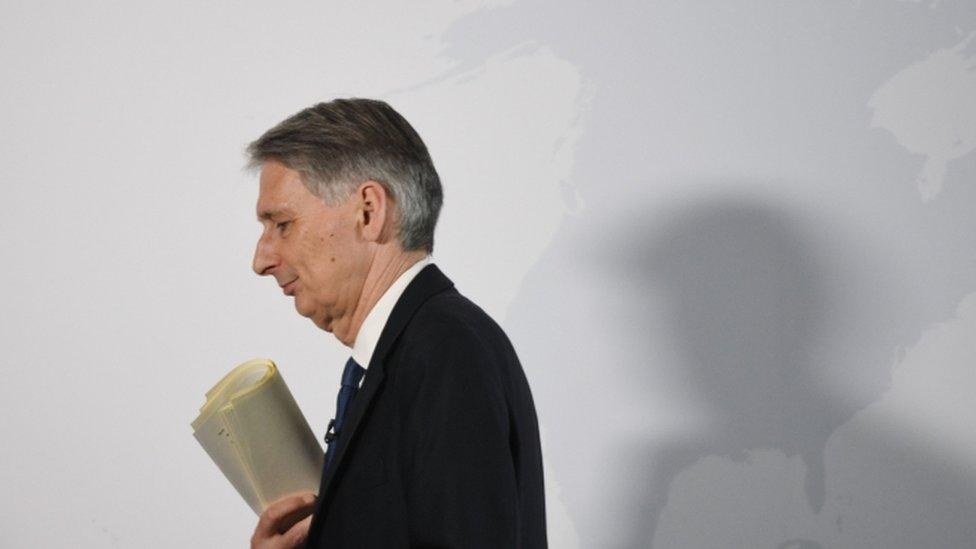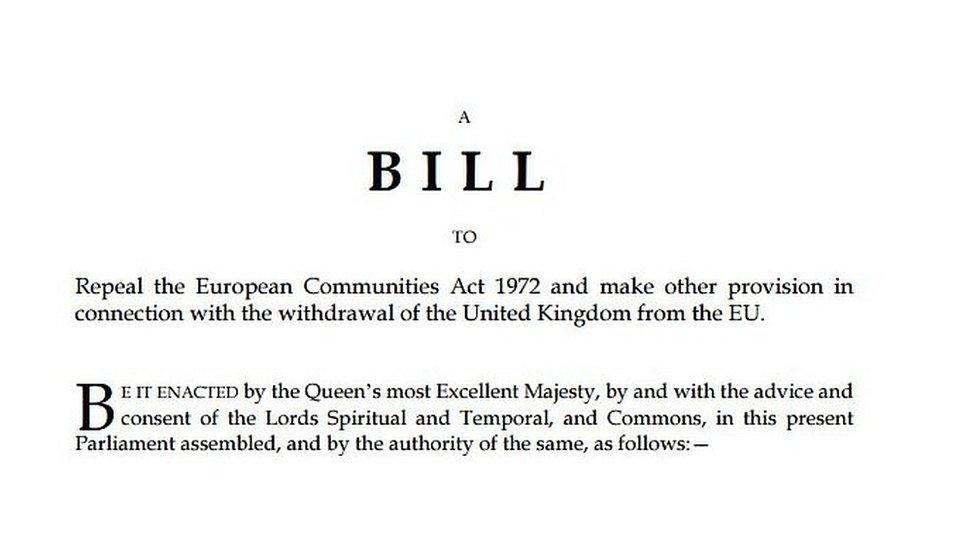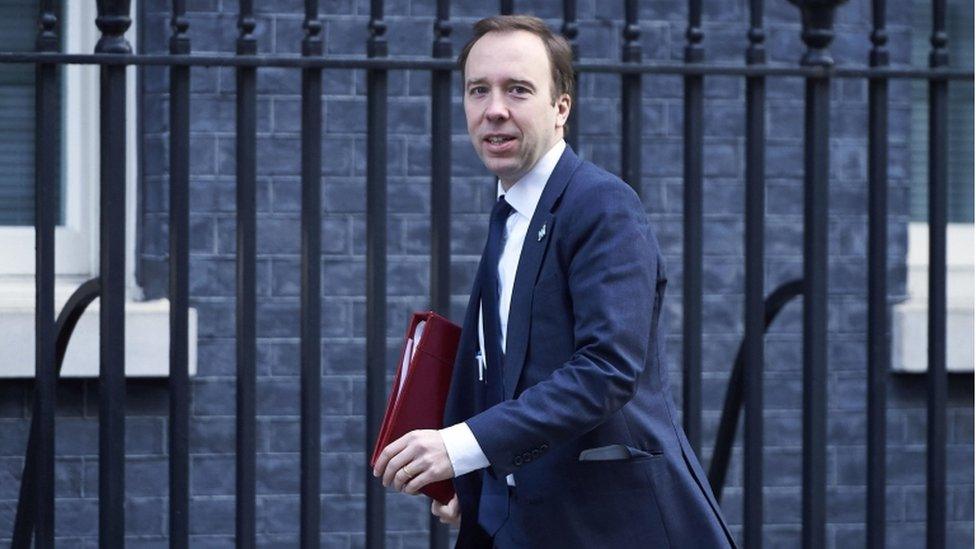Week ahead in Parliament
- Published

For once, the hottest show in town is not Brexit-related.
It's the week of the chancellor's Spring Statement, a pale shadow of the all-singing, all-dancing traditional Budget Day, but still a significant moment in the political (and possibly economic) calendar.
Elsewhere, watch out for the aftershocks of some of this week's events. The committee stage of the Sanctions and Anti Money Laundering Bill may be done, but the word is that, in the wake of the attempted assassination of Sergei Skripal in Salisbury, the government is now moving towards accepting so-called "Magnitsky" amendments designed to allow personal sanctions to be targeted on human rights abusers.
And in the wake of a new series of bullying allegations against named parliamentarians, including the Speaker, John Bercow, I wonder if we will see an attempt to raise the issue in the chamber.
It is normally not in order to make specific allegations against a named MP, but someone might have a go ...

And another little piece of fallout may follow the government's rejection of a "latte levy" on disposable coffee cups, as recommended by the increasingly assertive environmental audit select committee.
The MPs on EASC are not best pleased, so expect attempts to force a debate on the floor of the Commons.
Here's my rundown of the week ahead:
Monday 12 March
The Commons opens (2.30pm) with housing, communities and local government questions. The usual crop of post-weekend urgent questions and ministerial statements are likely to follow at 3.30pm.
The main business is to polish off the report and third reading stages of the Financial Guidance and Claims Bill.
It's not a wildly controversial measure but there is a bit of action; the government has put down amendments which would give the work and pensions secretary powers to ban unsolicited direct marketing in relation to consumer financial products and pensions - Work and Pensions Select Committee Chair Frank Field has put down his own amendment on this issue.
There's an official Labour amendment to require the new financial guidance body set up by the Bill to provide "mid-life reviews" for people over the age of 50, to prepare them for retirement.
Another Labour amendment would introduce a duty of care, which would require claims management services to act with the best interests of the customers in mind.

And a group of backbench Labour MPs led by Stella Creasy would require the new financial guidance body set up by the Bill to consider the effect of high-cost lending using credit cards on consumer protection and produce an annual assessment of any consumer detriment resulting from it.
My committee pick - following on from the departmental question time is the debut of the newly appointed minister of state for housing, Dominic Raab, and housing and homelessness minister Heather Wheeler at the newly rebranded housing, communities and local government select committee, at 4pm.
The session will focus on their department's housing priorities - and given Heather Wheeler has promised to resign if she fails to make a dent on homelessness and rough sleeping, it should be an interesting couple of hours.
In the Lords (2.30 pm) questions to ministers include crossbencher Baroness Meacher picking up the continuing controversy about the medicinal use of cannabis, raising its inclusion as an illegal drug in Schedule 2 to the Misuse of Drugs Act.

Then it's on to day six of committee stage debate on the European Union (Withdrawal) Bill - the focus will be on amendments to Clauses 9, 16, 17, which cover the main powers in connection with withdrawal and regulations and consequential and transitional provision.
Key issues include clinical trials, secondary legislation, data protection, modifying devolution by statutory instrument, consent, transport issues, delegated powers, tertiary legislation, chemical and financial services.
Tuesday 13 March
MPs start their day with business, energy and industrial strategy questions (11.30 am) before moving on to the Spring Statement by Chancellor of the Exchequer Philip Hammond.
This is a slimmed-down event compared to the traditional spring budget, now that the main action, in terms of big Treasury announcements, has been moved to the autumn.
But it will provide a snapshot picture of the health of the public purse, with all the latest official economic and fiscal forecasts.
These are likely to predict lower borrowing over the next five years than forecast in November.
But analysts expect the government's deficit will still be projected to be much greater than thought just two years ago, suggesting that austerity will continue, and that meeting the commitment to eliminate the deficit by the mid-2020s will remain extremely tough.
The Conservative former cabinet minister Theresa Villiers has a Ten Minute Rule Bill - her Holocaust (Return of Cultural Objects) (Amendment) Bill would extend a time limited law allowing a list of museums to return artworks in their possession which are discovered to have been stolen by the Nazis, in the 1930s and 1940s, to their rightful owners.

There will also be a three-hour debate on a series of statutory instruments "prayed against" by Labour. These make money-saving changes including an earnings threshold for free school meals, and for free childcare for two-year-olds, and changes to Universal Credit affecting self-employed and disabled people. The shadow education secretary, Angela Rayner, is seeking to block the changes, arguing that they will result in a "cliff-edge" as families' earnings rise.
In Westminster Hall there are debates on the diplomatic service (9.30-11 am); support for former miners with pneumoconiosis (11-11.30 am); the rights of victims of crime (2.30-4 pm); British nationals imprisoned abroad (4-4.30 pm) and the contribution to society of social workers (4.30-5.30pm).
In the Lords (2.30pm) ministers face questions on reforming the Apprenticeship Levy from the Labour former education secretary, Lord Blunkett, and on the government's assessment of the national scale of the "grooming gang scandal" from the former UKIP Leader, Lord Pearson of Rannoch.
Peers then rubber stamp the Supply & Appropriation (Anticipation and Adjustments) Bill - which they are forbidden from amending because it is a money measure.
Then comes the third reading of the Secure Tenancies (Victims of Domestic Abuse) Bill, - which again should be little more than a formality. The main business of the day will be the second reading of the Smart Meters Bill, where the key issues are the rollout of smart gas and electricity meters from 2018, the smart meter data service provider and OFGEM powers over licensing and billing.
Wednesday 14 March
MPs warm up with Wales questions (11.30 am) before prime minister's question time, which starts at 12 Noon.
Wednesday's Ten Minute Rule Bill, from the SNP's Alison Thewliss is on Safer Drug Consumption Facilities (SDCF). She has argued that current drug laws are "clearly not working", and wants the UK government to temporarily relax drug laws to allow the trial of SDCF to take place in Glasgow.
The city has an alarming level of drug-related deaths, and a cross-party alliance of local MPs support the trial to explore whether a new strategy could save lives.
Then MPs move on to the first part of an unusual two-day general debate on European Affairs - a chance to explore any number of Brexit-related themes.
In Westminster Hall, debates include: Foster care (9.30-11 am); the use, sale and distribution of electric dog collars (11-11.30 am); Women and work (2.30-4 pm); Allergy awareness in schools (4- 4.30 pm) and labour reforms in Qatar (4.30-5:30pm)

On the Committee Corridor, watch out for the Digital, Culture, Media and Sport Committee questioning the new Secretary of State Matt Hancock, on fake news.
In his debut before the committee, Mr Hancock will face questions about the government's response to the threat of fake news and digitally-driven foreign political interference.
In the Lords, peers make an early start (11 am) to try and make up a little ground in their consideration of the European Union (Withdrawal) Bill.
They're now up to day seven of what is supposed to be a ten-day committee stage, and it seems pretty certain more time will have to be found - the key issues in this section of the debate include the government's negotiating mandate, Henry VIII powers, some meaningful process (including a possible further referendum) and OBR assessment of the withdrawal agreement.
Those discussions will be interrupted at 3pm for question time, including an intriguing looking offering from the Lib Dem Lord Storey on the checks made on individuals before they meet the prime minister or cabinet ministers. After half an hour, peers will resume their debate on the EU (Withdrawal) Bill.
Thursday 15 March
The Commons begins (9.30 am) with Exiting the European Union questions - followed by the weekly statement on forthcoming business from Leader of the House Andrea Leadsom.
Given the day's Brexit theme, watch out for any clue as to the re-appearance in the House of the Trade Bill, which has been targeted with a series of amendments on issues like "a" Customs Union, by pro-EU Conservatives.
Then MPs move on to the second half of their general debate on European affairs.
In Westminster Hall (1.30 pm) Lib Dem former health minister Norman Lamb leads a debate on access and waiting time standards for early intervention in psychosis. That is followed at 3pm by a debate on the proposed takeover of GKN by Melrose, led by Labour MP Adrian Bailey.

In the Lords (11 am) questions to ministers include the government's plans to respond to the National Children's Bureau report "Children Missing Education" - an issue linked to a private members' bill to require closer monitoring of children being educated at home.
Then peers debate the government's Revised Draft Airports National Policy Statement - the document which will underpin any planning application to expand Heathrow Airport. This is followed by the debate on the chancellor's Spring Statement on the economy
Friday 16 March
Two SNP MPs have second reading debates on private members' bills from 9.30am. First Angus Brendan MacNeil's Refugees (Family Reunion) Bill, then the Unpaid Trial Work Periods (Prohibition) Bill from Stewart Malcolm McDonald.
Both may need a closure motion to go forward for detailed scrutiny, which means that they will need support from other parties, in order to scrape together the required 100 MPs.
There might be a certain edge to the normal Friday tactical games, after the last exciting episode in February.
Then the bill from the Conservative backbencher Glynn Davies, to give more British expats the right to vote in UK elections was given a lifeline by Deputy Speaker Eleanor Laing, who allowed a closure motion rather earlier than some expected.

That has led to a certain amount of Labour huffing and puffing - it even surfaced at this week's business questions.
Labour were "surprised" that a closure motion was allowed after just a couple of hours of debate - normally the chair does not "entertain" a closure motion until three hours or more of discussion on the floor of the House. Some go so far as to interpret the ruling as the first rumblings of a succession race, to replace Speaker Bercow.
There are any number of other private members bills' further down the agenda - but I suspect there will be no time left for them to be debated.
The Lords are not sitting.